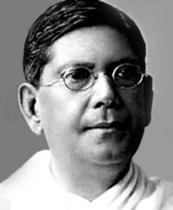 What is freedom? It is impossible to define the term; but one may describe it as that state, that condition, which makes it possible for a nation to realize its own individuality and to evolve its own destiny.
What is freedom? It is impossible to define the term; but one may describe it as that state, that condition, which makes it possible for a nation to realize its own individuality and to evolve its own destiny.
-Deshbandhu Chittaranjan Das
Presidential speech
I.N.C. Session, 1922, Gaya.
Born on 5 November 1870 in Calcutta, Chittaranjan Das, a revolutionary freedom fighter, was endearingly called ‘Deshabandhu’ (Friend of the Nation). Chittaranjan’s patriotic ideas were greatly influenced by his father, Bhuban Mohan Das, a reputed Solicitor of the Calcutta High Court. It was Bankim Chandra Chatterjee who influenced him in his political ideas. In 1917, Deshbandhu came to the forefront of nationalist politics. In that year he was invited to preside over the Bengal Provincial Conference held at Bhowanipore. His political career was brief but meteoric. In the course of only eight years he rose to all-India fame by virtue of his intense patriotism, sincerity and oratorical power.
He wanted “Swaraj for the masses, not for the classes”. To him, “Swaraj is government by the people and for the people”. An advocate of communal harmony and Hindu-Muslim unity, Deshbandhu effected, in 1923, the Bengal Pact between the Hindus and Muslims of Bengal, though opposed by a section of the Congress. A champion of national education and the vernacular medium, he felt that the masses should be properly educated to participate in the nationalist movement. He deprecated the prevalent western system of education that would only promote “a kind of soulless culture”. His religious and social outlook was liberal. He was against caste-discrimination and untouchability. A believer in women’s emancipation and widow re-marriage, he supported the spread of female education and widow remarriage.
Great as a jurist, and dynamic as a leader of Bengal, Chittaranjan was an apostle of Indian nationalism. In the words of Tagore, ” the best gift that Chittaranjan left for his countrymen is not any particular political or social programme but the creative force of a great aspiration that has taken a deathless form in the sacrifice which his life represented”.
The country lost one of its greatest sons on 16 June 1925.
